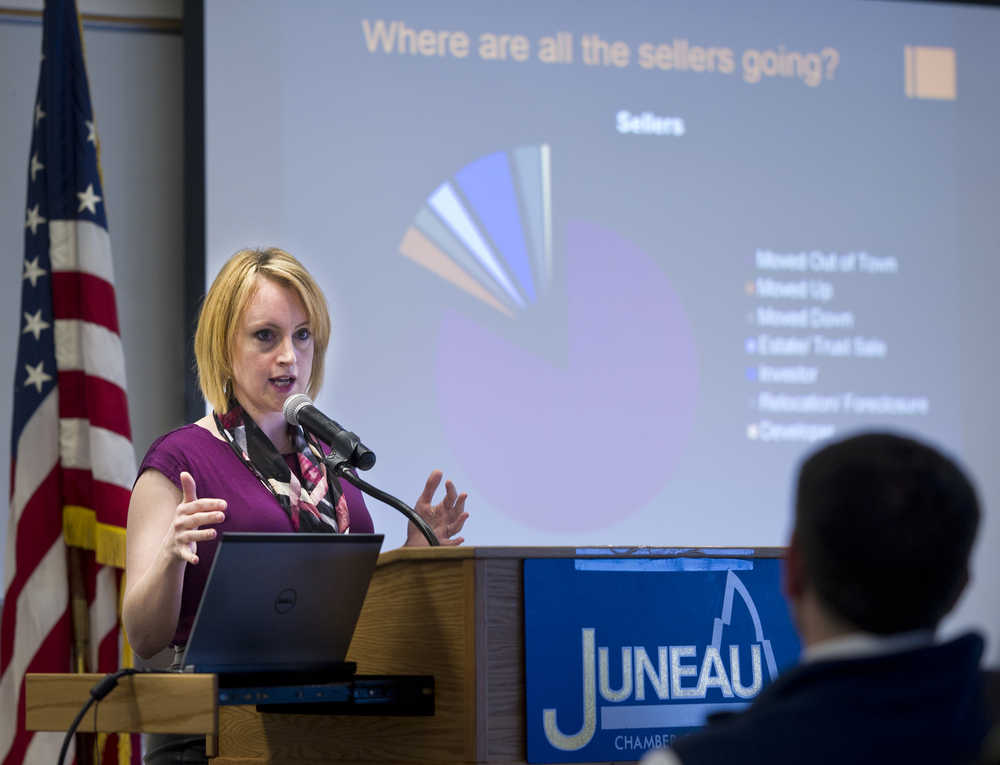Southeast Board of Realtors President Susan FitzGerald started by asking the audience at the Chamber of Commerce’s weekly Thursday luncheon to participate in a text-message poll. Before she told everybody how Juneau’s residential real estate market performed in 2015, she wanted to gauge people’s perceptions.
On a scale of “couldn’t get any better” to “it could be worse; I could be eating potatoes with a house on Mars,” most people present said that they are “worried about the housing market.” This answer won the poll by a wide margin with 52 percent of the responses. About a sixth of the audience said the market is “so/so,” and about a quarter of respondents said “things are good, but there is room for improvement.” Only 8 percent said the market couldn’t get any better, and apparently nobody in the room is interested in starting a colony on mars.
The takeaway from the poll — and from the presentation — was that when it comes to the health housing market, perspective is everything.
Between 2011 and 2015, the average price of single-family homes being sold in Juneau rose from $340,000 to $390,000. From FitzGerald’s perspective, and the perspective of the other real estate agents in the room, this is a good thing. But during the question-and-answer portion of the presentation, Assembly member Jerry Nankervis pointed out that this $50,000 spike isn’t good for everybody.
“As a seller, that’s great, but as a buyer, that’s distressing,” Nankervis said.
FitzGerald was quick to respond that the average home price is subject being swayed by outliers. Nankervis replied, the average price of single-family homes being sold has increased.
During the same four-year time span that the average price of single-family homes increased, the amount of time houses spend on the market fell, a fact that FitzGerald said speaks well of the market. In 2011, the homes typically stayed on the market for about 90 days. In 2015, homes only stayed on the market for about 50 days.
“To see a lower days-on-market number really indicates that we have a healthy market,” FitzGerald said. “Where we were last year is right where the National Association of Realtors likes to see it.”
Between 2014 and 2015, the number of single-family homes being sold in Juneau dropped slightly (from 209 to 200), according to data from the Multiple Listing Service, an “online database that all realtors in town contribute to.” The number of condos and attached homes being sold increased, however, which FitzGerald said is good. The number of condos and the number of attached homes sold rose by 20 respectively.
“Are we doing anything amazingly better? No,” FitzGerald said. “We’re holding pretty steady compared to a five-year average.”
It is worth noting that the MLS only accounts for sales made by real estate agents, not homes sold by their owners. Still, FitzGerald said the MLS tracks something on the order of 90 percent of home sales.
FitzGerald’s analysis of Juneau’s housing market is pretty well in keeping with the city’s, according to City Finance Director Bob Bartholomew.
“It’s stable to up slightly from the year before, and it has been on this trend for several years,” Bartholomew told the Empire after the luncheon.
There was one trend, though, that worried FitzGerald: the number of sellers who are leaving the city. Roughly 80 percent of the people who sold their homes last year left Juneau, she said.
“In my whole history of selling real estate, I’ve never seen this many people moving out of town,” she said.
After FitzGerald’s presentation, Juneau Economic Development Council Director Brian Holst pointed out that Alaska does have historically high migration rates. Data from the state Department of Labor and Workforce Development supports that. The department reported in 2015 that the state has one of the highest rates of migration in the nation.
“When we look at this we might also want to think that if 25 percent of people are buying back into Juneau, we need to look at that as a good thing,” Holst said.
FitzGerald also noted that so long as people are moving to town to fill the houses of those leaving, housing turnaround is a good thing.

